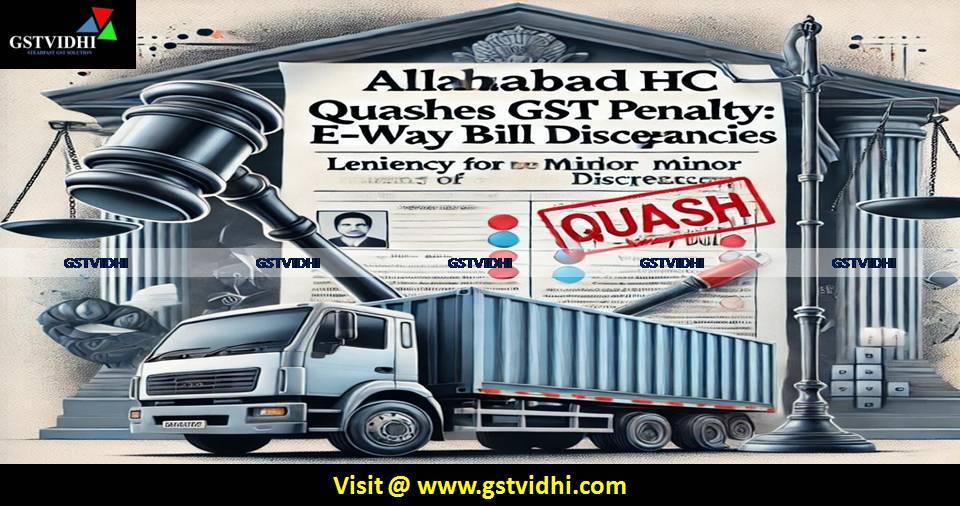
Leniency for Minor E-Way Bill Discrepancies - Allahabad
HC Quashes GST Penalty
By Yogesh Verma (CS/LLB) / 2 min read / GST Case Law
Introduction
The case of Rimjhim Ispat Limited vs. State of Uttar Pradesh & Others
addresses a critical issue regarding the imposition of penalties under Section
129(3) of the CGST Act, 2017, due to discrepancies in an e-way bill. The
Allahabad High Court's decision, dated September 12, 2024, clarifies the role
of intent in tax compliance and emphasizes the need to distinguish between
genuine mistakes and willful non-compliance.
Case Details
- Court: High Court of Allahabad
- Bench: Hon’ble Justice Shekhar B. Saraf and Hon’ble Justice
Manjive Shukla
- Case
Number: Writ Tax No. 1479 of 2024
- Judgment
Date: September 12, 2024
- Parties:
- Petitioner:
Rimjhim Ispat Limited
- Respondent:
State of Uttar Pradesh and 2 Others
Background of the Case
Rimjhim Ispat Limited faced detention of goods and
imposition of penalties under Section 129(3) of the CGST Act due to
discrepancies in the taxable amount mentioned in the e-way bill.
Key Events
1.
Transportation
and Documents: The petitioner was transporting
goods valued at ₹27,30,000. Due to a typographical error, the taxable value was
incorrectly recorded as ₹2,73,00,000 in the e-way bill.
2.
Detention
and Penalty: The authorities detained the
goods, citing discrepancies between the e-way bill and the accompanying
documents. A penalty was imposed under Section 129(3) of the CGST Act.
3.
Challenge
by the Petitioner: The petitioner filed a writ
petition, arguing that the discrepancy was a typographical error without intent
to evade tax.
Legal Framework
Section 129 of the CGST Act
1.
Authorizes detention, seizure, and
release of goods and conveyances during transit for non-compliance with GST
provisions.
2.
Imposes penalties for violations,
irrespective of intent.
Circular No. 64/38/2018-GST
- Issued
by the Central Board of Indirect Taxes and Customs (CBIC) on September 14,
2018.
- Provides
clarifications on the applicability of penalties for minor discrepancies
in e-way bills and emphasizes proportionality in enforcement actions.
Issues Raised
1.
Whether a typographical error in the
e-way bill justifies detention and penalty under Section 129(3) of the CGST
Act.
2.
Whether the authorities considered
the intent of the petitioner in determining non-compliance.
3.
Whether the writ court should
intervene when an alternative statutory remedy is available.
Submissions by the Parties
Petitioner’s Arguments
1.
Typographical
Error: The discrepancy in the taxable
value was due to a clerical error and did not reflect any intent to evade tax.
2.
Compliance
with Circular: The petitioner argued that
Circular No. 64/38/2018-GST provides relief for minor errors and mandates
leniency in such cases.
3.
Judicial
Economy: The petitioner contended that
relegating the matter to statutory appeals would waste time and resources,
given the clear nature of the error.
Respondent’s Arguments
1.
Statutory
Compliance: The respondents maintained that
discrepancies in e-way bills constitute non-compliance, justifying detention
and penalties under Section 129(3).
2.
Alternative
Remedy: They argued that the petitioner
should pursue statutory appeals rather than invoke writ jurisdiction.
Findings of the Court
1.
On
Typographical Error: The court noted that the
discrepancy in the taxable value was clearly a typographical error with no
indication of tax evasion.
2.
Applicability
of Circular No. 64/38/2018-GST:
The court emphasized that the circular allows leniency for minor discrepancies,
and the authorities failed to consider this guideline.
3.
Judicial
Economy: The court exercised its writ
jurisdiction, reasoning that relegating the petitioner to statutory appeals
would cause unnecessary delays, given the clear factual matrix.
4.
Penalty
Not Justified: The court held that the imposition
of penalties under Section 129(3) was unwarranted, as the error did not affect
the tax liability or indicate an intent to evade tax.
Judgment
The Allahabad High Court quashed the detention order and
penalty imposed under Section 129(3). It directed the authorities to release
the detained goods and vehicle within two weeks of receiving the certified copy
of the judgment.
Analysis
Clarification on Minor Discrepancies
This judgment reinforces the principle that minor errors in
e-way bills, which do not affect tax liability, should not result in severe
penalties.
Proportional Enforcement
The court’s reliance on Circular No. 64/38/2018-GST
underscores the need for proportionality in enforcement actions under GST laws.
Efficient Use of Judicial Resources
By intervening directly, the court prevented unnecessary
litigation, promoting judicial efficiency and fairness.
Conclusion
The decision in Rimjhim Ispat Limited vs. State of Uttar
Pradesh & Others serves as a significant precedent for taxpayers and
GST authorities, emphasizing the importance of proportionality and intent in
enforcing GST compliance. It highlights the judiciary’s role in safeguarding
taxpayers from disproportionate penalties for genuine errors.
Disclaimer: All the Information is based on the notification, circular and order issued by the Govt. authority and judgement delivered by the court or the authority information is strictly for educational purposes and on the basis of our best understanding of laws & not binding on anyone.
Find the Attachment (Press on Click Here )
Click here